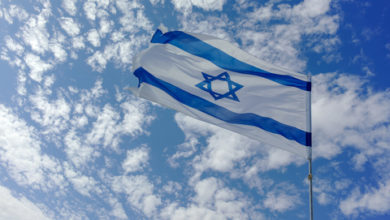A Sound of Silence | Haftarah
What is the meaning of the Divine revelation to the Prophet Elijah at Mount Horeb? The explanation given by Rav Tzvi Yehuda Kook is well known, that in a way it was a lesson for Elijah, accompanied by a scolding, since his zealous defense of G-d was not perfect and was tainted by a personal matter, when he said, “They wanted to kill me” [Kings I 19:10,14]. However, this still leaves us with a need to understand the nature of Elijah’s vision, which took place in several stages.
Elijah leaves his young assistant behind in Beer Sheva (19:3), just as Avraham left his young servants when he started to climb up to the Binding of Isaac. Elijah goes into the desert and asks to die, similar to the way that Isaac was willing to be brought up as a sacrifice. And an angel rescues Elijah, reminiscent of the rescue of Isaac. The angel gives him another command, to eat cake baked on coals and to drink from a flask of water, reminiscent of the way that Isaac ate when he was about to bless his son Jacob. Thus, all that happens until this point is a repeat of the actions of the patriarchs, specifically the process of elimination which led to the choosing of Israel. This all hints that once Israel was chosen it was wrong for Elijah to give up on the nation.
From this point on, Elijah’s actions can be compared to those of Moses. He does not eat for forty days and forty nights, and he climbs up to the cave where Moses spent his time on Mount Sinai. However, instead of defending the people as Moses did, he accuses them: “The Children of Israel have abandoned Your covenant!” [19:10]. And he is therefore told to leave the cave, as opposed to Moses who received a revelation. For Elijah, we are told, “Behold, G-d passed by” [19:11]. With Moses, it is written, “And G-d passed in front of him” [Exodus 23:6], revealing the trait of mercy. In Elijah’s case, the harsh trait of justice was revealed, with its destructive power: “A great and powerful wind which smashes mountains and shatters rocks before G-d” [Kings I 19:11].
It may well be that the same wind is what caused rocks to fall from Mount Sinai in the time of Moses, when anybody who climbed up the mountain would be “stoned or thrown down” [Exodus 19:13]. The phenomena of an earthquake and fire also took place in the time of Moses: “And the mountain trembled very much” [19:18], and “the appearance of the glory of G-d was like a fire devouring the peak of the mountain” [24:17]. However, Elijah is taught that “G-d does not appear in the wind… or the earthquake, or the fire,” since the name of “yud-heh-vav-heh” indicates mercy, which is the proper trait for leading the nation. Wind, earthquake, and fire are elements of punishment: Storms in this world, a quake when the soul leaves the body, and fire in Gahanna. As opposed to these, a “thin sound of silence” [Kings I 19:12] denotes patience and mercy as a way of leading. On seeing this, Elijah “wrapped his face in his cloak” [19:13], similar to Moses who put a mask on his face when he was told that G-d had forgiven the nation for the sin of the Golden Calf. And then Elijah was privileged to experience another revelation, “And behold, there was a voice” [ibid], reminding us of what Moses heard in the Tent of Meeting, coming from the space between the two Cherubs.
May you be blessed with good and healthy life and abundance.
————– In the meantime until the prophecy will come back:
Have a doctor’s appointment and feel the need to pray?
Looking for a partner? wanted to ask God’s help?
Need help making a living and want to know how to pray?
Looking for the right words prophetic tradition to thank the Creator?
Wish to pray Like the Old Testament prophets?
The prayers which was passed on traditionally
from the time of the Prophets – And have been
preserved for thousands of years among the people of Israel?!
Source: “NOTES FROM THE HAFTARAH” – a biweekly column in Shabbat B’Shabbato (Zomet Institute) See: http://www.zomet.org.il/eng – Pinchas 5776, issue 1633.



